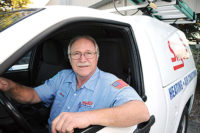
Jeryll McWhorter, left, and Brian Lovell head up the newest HVACR programs at DeKalb Technical College.
For a number of years, there were many who said vocational schools and community colleges were considered successful if they offered broad brushstrokes of training in the basics of mechanical systems. Then once graduates got jobs, their employers - be they contractors, wholesalers, or manufacturers - took on the task to teach them the specifics needed within each of their businesses.
But now, Jeryll McWhorter and Brian Lovell say, the detailed training is shifting back to the technical colleges. At least that is the case where they teach, DeKalb Technical College in Clarkston, Ga.
An advisory board made up of industry professionals is pushing the step up in specific training, said the two instructors. In addition, manufacturers are donating some of the latest equipment. The result has been the addition this academic year of two programs at DeKalb – Commercial Refrigeration with McWhorter as director and Building Automation Systems with Lovell as director. These are in addition to the existing HVAC offerings.
“The industry is driving these programs,” said Lovell.
INDUSTRY-DRIVEN
Regarding the Commercial Refrigeration program, McWhorter said, “The industry has played a major role in setting up the laboratory and in providing guidance in the curriculum from the very start. There has been unprecedented industry support for the program as all major refrigeration equipment manufacturers and contractors in the Atlanta area are involved.”He said an example of the shift in terms of academia’s responsibilities is a supermarket chain in the area asking DeKalb to provide the specific training needed by the service technicians after the chain had been doing so previously. It is also happening among manufacturers, he said, who have reduced their own training programs often as a cost consideration.
The refrigeration classroom now includes supermarket cases, walk-in coolers and freezers, glycol-based units, a rack room, and other features.
Lovell described the Building Automation Systems (BAS) program as “a very unique program to Georgia and one of only a couple in the country specific to the building automation industry.” He said the BAS program has also obtained “unprecedented industry support with all major buildings controls companies providing guidance and assistance.”
He said courses in BAS cover architecture, installation, logic, design, commissioning, and integration. The Leadership for Energy Efficient Design (LEED) program is also explained. BAS program instruction includes pneumatic, electric, and direct digital controls.
“Things are changing so fast in building automation,” he said.
GROWTH FORECAST
Since the two programs began this academic year, more than 50 students have taken part in each. Overall the HVACR program at DeKalb has about 300 students. “Actually word is just getting out,” said Lovell who expects enrollment to increase in upcoming years.The students include both those entering the industry for the first time, as well as those who have been in the field for 15 to 20 years and are wanting to learn different aspects of their trade.
Each program offers a four-quarter diploma and an Associate of Applied Science Degree. And in both cases, credits that students earn are accepted at colleges offering four-year HVACR programs. McWhorter said portions of that third- and fourth-year study can be done online, but travel a couple times a year is needed to the campus of the four-year college, as with the program done in conjunction with Ferris State University in Big Rapids, Mich.
There is a connection between McWhorter and Lovell beyond being directors of the respective Commercial Refrigeration and BAS programs. McWhorter has been an instructor for 20 years and Lovell was one of his students 18 years ago. “It has been a fulfilling experience to observe and assist Jeryll in establishing these programs,” said Lovell.
For the two of them, there is a bottom line amidst all the fanfare over the new programs, the new equipment and the industry-wide commitment.
Said McWhorter, “The mission of the program is to produce graduates well grounded and familiar with industry practices to secure gainful employment in this fast-evolving field.”
For more information, visit www.dekalbtech.edu.
Publication date:04/12/2010






